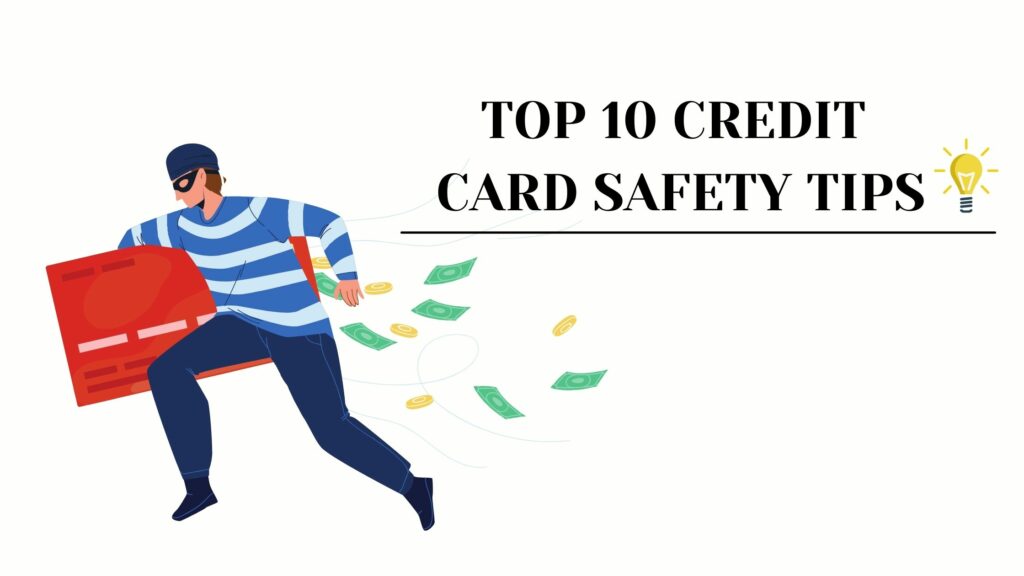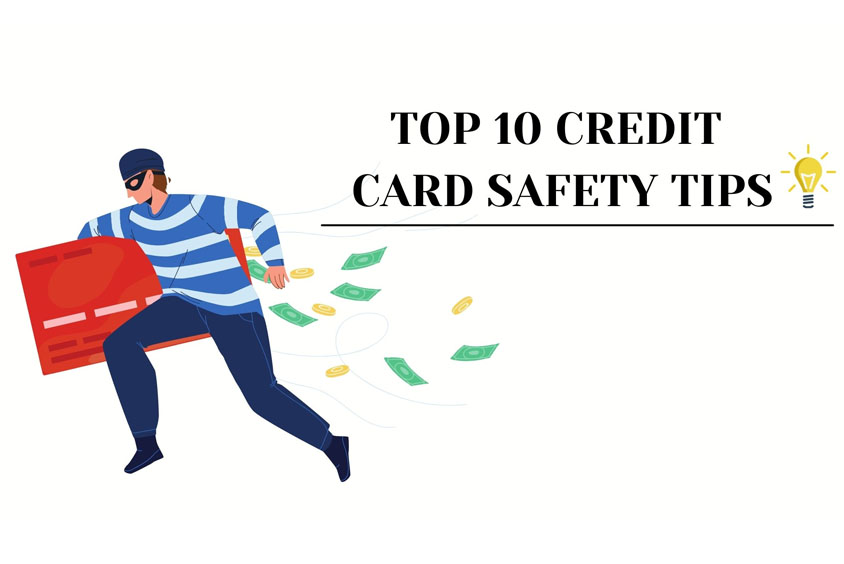Using a credit card can be convenient and helpful for making purchases, but it is important to be cautious to protect yourself from card fraud and theft. Credit card safety involves taking steps to keep your card information safe from unauthorized access. Activities like credit card fraud, and identity theft are increasing day by day.
Have you ever wondered why credit card fraud occurs? The answer is that sometimes cardholders fail to take the necessary steps to keep their cards safe and secure. To assist you in safeguarding this valuable financial tool, we have compiled a list of credit card safety tips to prevent fraudulent activities and misuse.

Tips for Credit Card Safety
1. Avoid Sharing Confidential Information
Confidential information, such as OTP, CVV, credit card number, PIN, expiry date, Internet banking password, etc, should never be shared with anyone; not even with your close ones. Even if someone pretends to be from the bank and asks for this kind of detail, never make the mistake of sharing it with them. Banks or card issuers don’t ask you to share such information, not even in the worst case. These things are meant to be used only and strictly by the particular account holder or the cardholder.
2. Beware of Fake Calls
You may receive some calls in which they offer you coupons, lotteries, reward points, jobs, etc, and ask for some personal/confidential information like OTP. As stated in the previous point, never provide any details related to your bank or credit card. If you do so, your card can be misused and you can be left with high debt. Moreover, if you suspect any fraudulent activity with your card, report it immediately to your bank and get your card blocked then and there.
3. Don’t Share Sensitive Financial Information On Social Media
Sharing sensitive financial information on social media can put your credit card at risk. It’s important to keep in mind that social media sites are open forums where everyone may view the information you post, including scammers. Hence, it’s always advisable to keep your credit card details private and not share them on social media platforms. Even a small mistake can lead to fraudulent activities and cause you a lot of trouble. So, stay safe and be cautious while using social media.
4. Credit Card is Always Used in the Presence of the Owner
You might have trusted many people blindly, it is never advisable to do that in the case of credit cards. You should never hand over your credit card to someone else even for a few seconds. However, if you give it to someone in an emergency case or something like that, make sure that you are present there when the card is being used. It is better to be aware than to be left with debt for which you are not even responsible.
5. Review Transaction Alerts on Messages/Emails
It is essential to review the transaction messages you receive on SMS or Email to ensure that no fraudulent transactions are being done. It will also help you to keep track of your spending and hence you can compare these messages with your billing statement. If you are receiving a message or email for a transaction that you never did, report it immediately to your credit card customer care.
6. Change Your Passwords & PIN Regularly
Many people write their banking passwords, PINs, CVV, etc in a notepad or notes on their phones to store them. But, it is not at all advisable to do so. You should never write your passwords or any such confidential information anywhere. You need to keep changing your password/PIN at regular intervals to ensure that anyone close to you can not guess it. Moreover, keep in mind that all your banking passwords and PINs are not the same. Try to keep each of them different if you want to secure your account from fraudulent activities.
7. Get Virtual Account Numbers
Virtual account numbers are unique card numbers that can be used for one-time purchases. These numbers are generated by your credit card issuer and add an added layer of security while shopping online. By using a virtual account number, you can protect your actual credit card number from being exposed to potential fraud or data breaches. It’s easy to get virtual account numbers for your credit card – simply log in to your account online and follow the prompts to generate a new number.
8. Keep Your Contact Information Updated
Make sure that the mobile number and email ID on your Internet banking profile is active and that you are using it. If you have changed your number/Email and are no longer using the previous one, update it in your Internet banking profile as well so that you can receive messages about your transactions and important information about your account. You won’t be notified of any fraudulent activity conducted on your card if you are using a different number that isn’t current with the bank because you won’t get any messages about your transactions.
9. Set Limit on Cards
Setting limits on your credit card can be a helpful way to manage your spending and prevent overspending. You can set limits on your card for various categories like online transactions, international transactions, and even daily spending limits. Setting limits allows you to stay within your budget and avoid any surprises when the bill arrives. It’s a simple step that can go a long way in ensuring responsible credit card usage.
10. Watch out for Phishing Scams
Phishing scams are a common type of fraud that can affect credit card users. These scams usually involve fraudulent emails or text messages that trick you into giving away your personal or financial information. To protect yourself from phishing scams on credit cards, it’s important to be cautious of any emails or messages that ask for your credit card details or login credentials. Always double-check the sender’s email address or phone number and never click on suspicious links or download attachments from unknown sources. If targeted in a phishing scam cardholders should immediately report to the banks or credit card companies.
Bottom Line
Being aware of these credit card safety tips is highly important to reduce credit card-related fraud. Having a credit card and setting up passwords is not all you need to do. By following the basic principles of credit card safety such as keeping the card details confidential, and monitoring unusual activity in your account to reduce the risk of scams. Make sure you always keep all of these things in mind when doing transactions, whether they are online or offline.
Stay vigilant, stay informed, and keep your credit card transactions secure. With these simple steps, you can confidently navigate the world of credit card usage while protecting your financial peace of mind.










1 Comment
Helpful